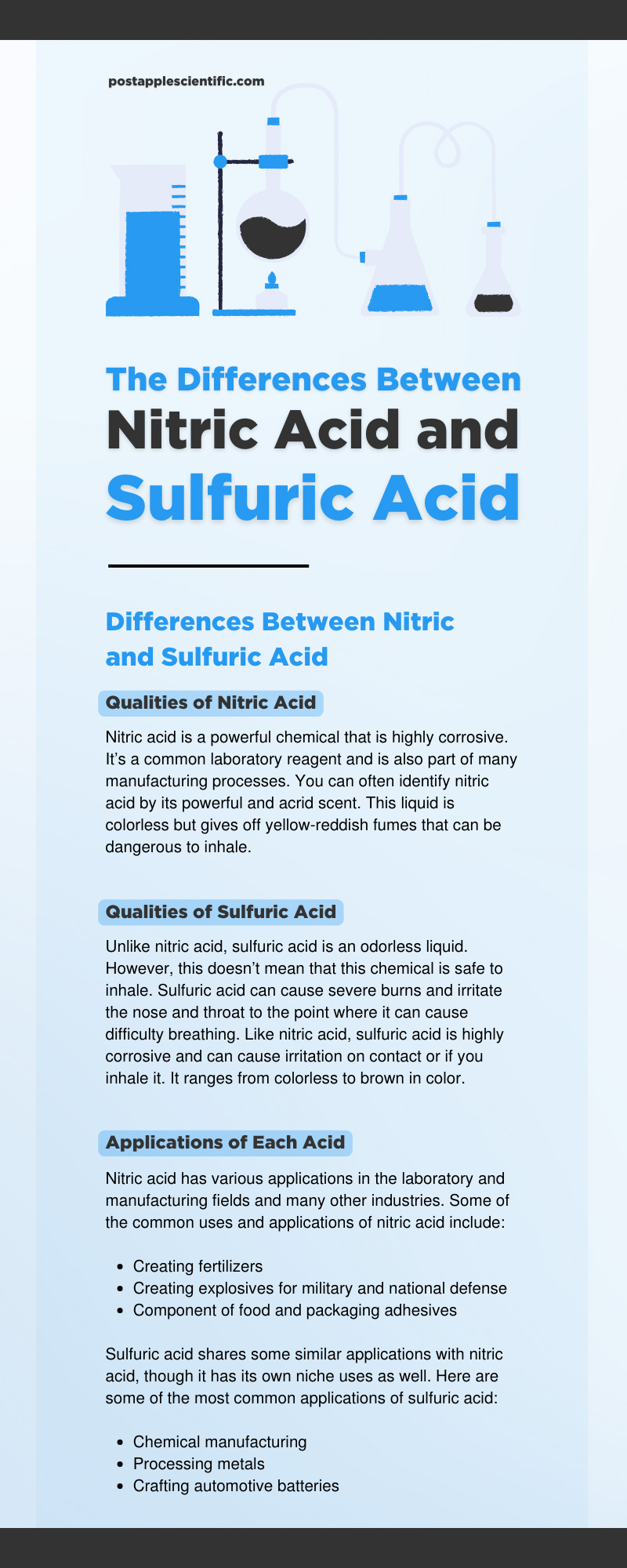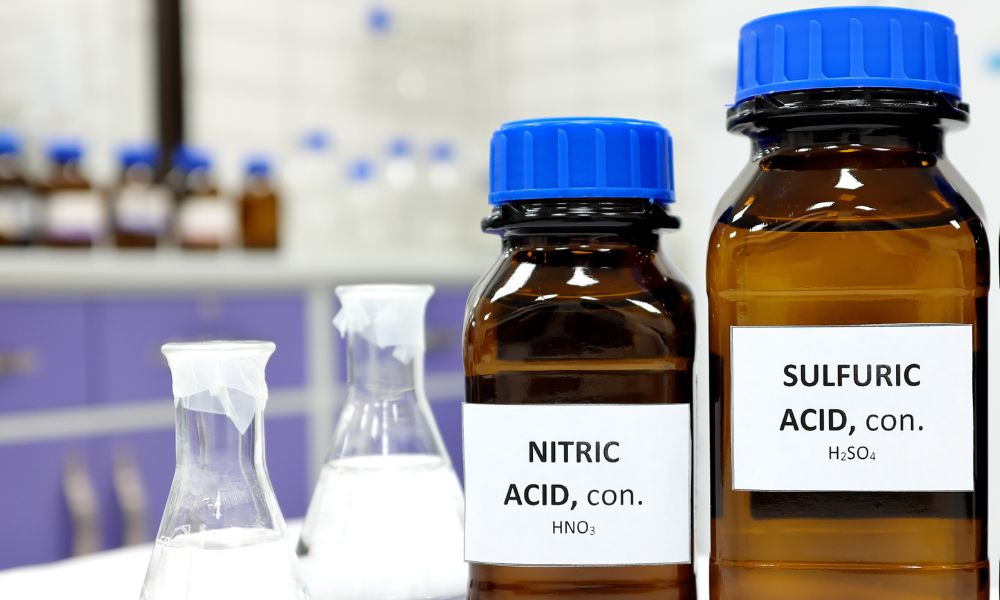Nitric and sulfuric acids are both corrosive materials that have many similar qualities and applications. However, these chemicals also have their own unique conditions in many fields. If you’re interested in nitric or sulfuric acids for your laboratory or manufacturing business, you’ll want to know more about each. Keep reading to learn some of the similarities and differences between nitric and sulfuric acid. You can also learn more about their unique applications and why you may want to invest in these chemicals for your business.
Differences Between Nitric and Sulfuric Acid
Before you purchase chemicals for your laboratory or manufacturing needs, you must know the differences between the materials you’re working with. For example, nitric and sulfuric acid are similar chemicals with similar applications, so you need to be careful not to confuse them. Both acids can be extremely dangerous, so getting them confused or handling them incorrectly could have disastrous consequences. Keep reading to learn more about each type of chemical and the differences you should know.
Qualities of Nitric Acid
Nitric acid is a powerful chemical that is highly corrosive. It’s a common laboratory reagent and is also part of many manufacturing processes. You can often identify nitric acid by its powerful and acrid scent. This liquid is colorless but gives off yellow-reddish fumes that can be dangerous to inhale. Because of its fumes and high corrosiveness, laboratory workers and manufacturers must handle it with extreme care—exposure to this chemical can cause conditions ranging from eye and skin irritation to harmful breathing conditions.
Qualities of Sulfuric Acid
Unlike nitric acid, sulfuric acid is an odorless liquid. However, this doesn’t mean that this chemical is safe to inhale. Sulfuric acid can cause severe burns and irritate the nose and throat to the point where it can cause difficulty breathing. Like nitric acid, sulfuric acid is highly corrosive and can cause irritation on contact or if you inhale it. It ranges from colorless to brown in color. Additionally, it requires careful storage in the laboratory and manufacturing spaces because it can produce hazardous and flammable gases that can cause explosions.
Applications of Each Acid
Nitric acid has various applications in the laboratory and manufacturing fields and many other industries. Some of the common uses and applications of nitric acid include:
- Creating fertilizers
- Creating explosives for military and national defense
- Component of food and packaging adhesives
- Purifies metals
- Processes dyes in manufacturing
- Coats furniture
- Critical cleaning agent and pH buffer in laboratories
Sulfuric acid shares some similar applications with nitric acid, though it has its own niche uses as well. Here are some of the most common applications of sulfuric acid:
- Chemical manufacturing
- Processing metals
- Crafting automotive batteries
- Cleaning agent for drain un-blockers, detergents, and chemical sprays
- Creates agricultural fertilizer
As you can see, the corrosive nature of both acids leads them to some similar applications. However, both have unique uses as well, especially in the manufacturing and laboratory studies industries. No matter how you use them, you must handle both nitric and sulfuric acid with care due to their corrosive and hazardous qualities.
Storage and Handling of Each Acid
If you work in laboratory studies or manufacturing, you may already know the careful practices that using these chemicals requires. If you’re not already familiar with the right procedures or you need a safety refresher, here are some tips for handling these dangerous chemicals.
Sulfuric acid is more corrosive than nitric acid, making it more dangerous to handle and transport. Note that PPE is necessary for handling both acids. PPE is extremely important when using nitric and sulfuric acid due to the hazardous nature of both chemicals. When working with either chemical, you must have a controlled environment, such as a fume hood. Corrosion-resistant fume hoods are useful for laboratory testing processes because of the corrosive nature of both chemicals.
You should always use protective eyewear, such as safety goggles or glasses, to protect yourself from eye irritation or chemical splashes. Respirators are also necessary when using both nitric and sulfuric acid. You should always use a respirator mask and work in a well-ventilated area with these chemicals to prevent airway irritation.
When storing nitric and sulfuric acid, label them carefully. These acids can be flammable and cause explosions, so mark them as such and store them away from any heat sources in your laboratory.
How To Distinguish Nitric and Sulfuric Acid
Because they have similar applications, nitric and sulfuric acid can seem quite similar. However, these acids have unique properties and traits to help you tell them apart. While both can be colorless, sulfuric acid can also appear browner in color.
The odor from nitric acid can help you identify the chemical. Nitric acid has an acrid smell, while sulfuric acid is odorless (though you should avoid inhaling either chemical for safety purposes). Be sure to label these chemicals so as not to confuse them during your laboratory experiments or other applications.
Which Acid Is Better for Your Lab Applications
Now that you know the differences between nitric and sulfuric acid, as well as how to handle them and tell them apart, you may be wondering which acid is best for your laboratory applications. Both can fill several laboratory roles, such as helping to calibrate instruments and equipment, cleaning equipment parts, and causing reactions. But which one will work for your laboratory?
The powerful scent of nitric acid can be more of an irritant than sulfuric acid, so keep this in mind when ordering your materials. However, nitric acid is extremely effective as a pH buffer and cleaning agent, so don’t rule it out.
Now that you know the differences between nitric and sulfuric acid, you can more accurately choose the best solutions for your laboratory or manufacturing applications. If you’re interested in learning where to buy nitric acid and other chemicals for a variety of applications, you can find high-quality solvents and solutions at Post Apple Scientific. Due to its unique conditions, nitric acid can be difficult to obtain, but our careful handling processes ensure that you receive stable, high-quality chemicals for your laboratory needs. Browse our full selection of chemicals at Post Apple Scientific today.


